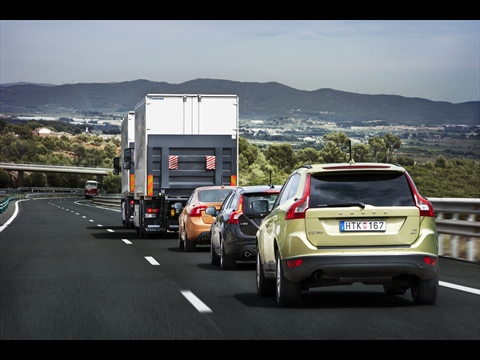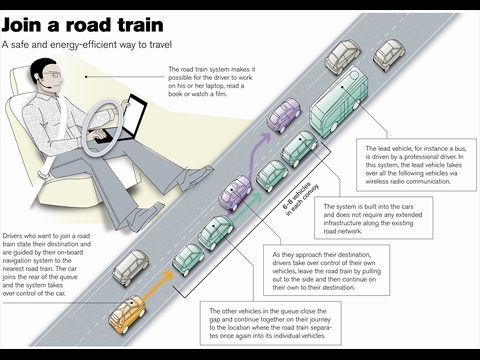Volvo’s autonomous cars travel 124 miles in Spain in ‘road train’
May 31, 2012

Automated cars pass road-train test on public highways in Spain (credit: Volvo Car Corporation)
Volvo has tested its fuel-saving”road train” technology on public roads in Spain, finding the historic test “highly successful.”
Volvo used one lead vehicle and four trailing vehicles — consisting of a Volvo S60, a Volvo V60 and a Volvo XC60 plus a truck — that drove autonomously for 200 kilometers (124 miles) at 85 kilometers an hour (53 miles per hour) on the roads outside Barceolona.
Existing safety systems enhanced by wireless communication
Building on Volvo Car Corporation’s and Volvo Technology’s already existing safety systems — including features such as cameras, radar and laser sensors — the vehicles monitored the lead vehicle and also other vehicles in their immediate vicinity.
By adding in wireless communication, the vehicles in the platoon “mimic” the lead vehicle using Ricardo UK’s autonomous control — accelerating, braking and turning in exactly the same way as the leader.
“Everything should function without any infrastructure changes to the roads or expensive additional components in the cars,” said Linda Wahlström, project manager for the SARTRE (Safe Road Trains for the Environment) project at Volvo Car Corporation. “Apart from the software developed as part of the project, it is really only the wireless network installed between the cars that set them apart from other cars available in showrooms today.”
Goals: safety, fuel reduction, comfort
The technology is designed to “improve traffic safety, reduce environmental impact and — thanks to smooth speed control — cut the risk of traffic tailbacks (rear-ending),” said Wahlström.
The three-year SARTRE project has been under way since 2009. All told, the vehicles in the project have covered about 10,000 kilometers.
After the test on the public roads in Spain, the project is now entering a new phase with the focus on analysis of fuel consumption. Volvo has estimated that road trains as in the SARTRE project could reduce fuel costs by up to 20 percent.
The project also aims to deliver improved comfort for drivers, who can now spend their time doing other things while driving. They can “work on their laptops, read a book or sit back and enjoy a relaxed lunch.”
